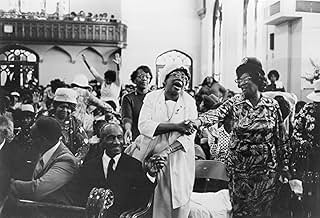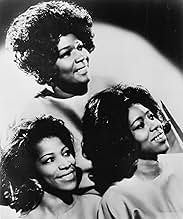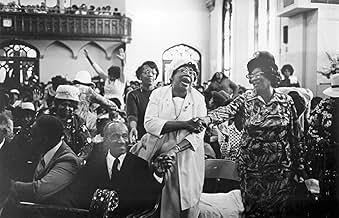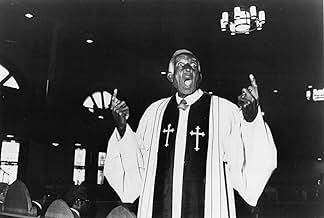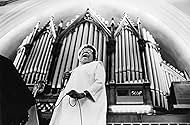Adicionar um enredo no seu idiomaDocumentary about the American gospel music scene, focusing on two of the movement's pioneering forces, Thomas A. Dorsey and Willie May Ford Smith.Documentary about the American gospel music scene, focusing on two of the movement's pioneering forces, Thomas A. Dorsey and Willie May Ford Smith.Documentary about the American gospel music scene, focusing on two of the movement's pioneering forces, Thomas A. Dorsey and Willie May Ford Smith.
- Prêmios
- 1 vitória e 1 indicação no total
Willie Mae Ford Smith
- Self
- (as Willie May Ford Smith)
Billie Barrett GreenBey
- Self
- (as Billie Greenbey)
Rodessa Barrett Porter
- Self
- (as Rhodessa Porter)
Frank Campbell
- Self
- (as Rev. Frank W. Campbell)
Melvin Smotherson
- Self
- (as Rev. Melvin Smotherson)
Avaliações em destaque
Say Amen Somebody caught my attention when I found film critic Roger Ebert's 4/4 star review of it. Not only did he give it his highest rating, but he also called it the 8th best movie of 1983.
Christian based movies are my favorite genre of film (The Prince of Egypt and The Apostle are included, Noah and God's Not Dead are NOT), so the acclaim and the subject matter intrigued me.
However, it wasn't available on Amazon for a long time and in most places online it was expensive to get on DVD, due to its rarity. However, the channel TCM (Turner Classic Movies) played it today at Noon Michigan Time as a celebration of Juneteenth. And to TCM, I owe a huge amount of gratitude. This is now one of my favorite documentaries and one of the best religious films I have ever seen.
Say Amen Somebody is a documentary about black Gospel singers (in fact if there WERE any white people in this film, they were in the background), and the focus is mainly on 2 big names in Gospel, Thomas A. Dorsey and Willie May Ford Smith. We hear much of their beautiful music and hear stories about their lives.
One powerful aspect of SAS is the music. In fact, the movie is at its best when the Gospel Singers are performing. Dorsey at one point tells us how he was inspired to write Take My Hand, Precious Lord and how often Gospel music churches sing that now. (On a related note, Elvis made that song quite popular as well.) Near the end, the congregation sings Jesus Loves Me.
My upbringing with church music is more traditional and modern worship, but Gospel music...not so much. As a result, most of these songs were new to me. I'd have to listen to the music more for it to be stuck in my head, but I did enjoy many of the songs, such as Jesus Dropped The Charges and I'm His Child.
When there isn't any singing- something you would expect MORE of in a music documentary, we hear the life stories of Dorsey and Smith, and a few other Gospel singers. Especially near the end, when Dorsey needs a walker and his health deteriorates and must decide if he is going to be able to attend a Gospel convention. SAS is proof that documentaries can be as much of an effective drama as a movie with a narrative.
SAS is also well paced, and time flies. It's only 100 minutes long, but it seemed to be only an hour or so. I was so invested that time wasn't an issue in any way.
The film is also very joyous and uplifting. Ebert even began his written review by calling it "The most joyous movie I've seen in a long time." The singing and conclusion are such a delight that I even wanted to stand up with my hands in the air. Non-Christians could possibly see this movie and praise God due to how infectious the mood of the film is.
Say Amen Somebody is therefore a joyous and uplifting documentary that needs more attention. Even if you are not a Christian, I still highly recommend it, because as long as you have emotions, religious belief is not required to thoroughly enjoy and be moved by this movie.
TCM- please play this more (on Easter would be awesome), and I hope it sells more on Amazon. Simply put, see this movie, somebody!
Christian based movies are my favorite genre of film (The Prince of Egypt and The Apostle are included, Noah and God's Not Dead are NOT), so the acclaim and the subject matter intrigued me.
However, it wasn't available on Amazon for a long time and in most places online it was expensive to get on DVD, due to its rarity. However, the channel TCM (Turner Classic Movies) played it today at Noon Michigan Time as a celebration of Juneteenth. And to TCM, I owe a huge amount of gratitude. This is now one of my favorite documentaries and one of the best religious films I have ever seen.
Say Amen Somebody is a documentary about black Gospel singers (in fact if there WERE any white people in this film, they were in the background), and the focus is mainly on 2 big names in Gospel, Thomas A. Dorsey and Willie May Ford Smith. We hear much of their beautiful music and hear stories about their lives.
One powerful aspect of SAS is the music. In fact, the movie is at its best when the Gospel Singers are performing. Dorsey at one point tells us how he was inspired to write Take My Hand, Precious Lord and how often Gospel music churches sing that now. (On a related note, Elvis made that song quite popular as well.) Near the end, the congregation sings Jesus Loves Me.
My upbringing with church music is more traditional and modern worship, but Gospel music...not so much. As a result, most of these songs were new to me. I'd have to listen to the music more for it to be stuck in my head, but I did enjoy many of the songs, such as Jesus Dropped The Charges and I'm His Child.
When there isn't any singing- something you would expect MORE of in a music documentary, we hear the life stories of Dorsey and Smith, and a few other Gospel singers. Especially near the end, when Dorsey needs a walker and his health deteriorates and must decide if he is going to be able to attend a Gospel convention. SAS is proof that documentaries can be as much of an effective drama as a movie with a narrative.
SAS is also well paced, and time flies. It's only 100 minutes long, but it seemed to be only an hour or so. I was so invested that time wasn't an issue in any way.
The film is also very joyous and uplifting. Ebert even began his written review by calling it "The most joyous movie I've seen in a long time." The singing and conclusion are such a delight that I even wanted to stand up with my hands in the air. Non-Christians could possibly see this movie and praise God due to how infectious the mood of the film is.
Say Amen Somebody is therefore a joyous and uplifting documentary that needs more attention. Even if you are not a Christian, I still highly recommend it, because as long as you have emotions, religious belief is not required to thoroughly enjoy and be moved by this movie.
TCM- please play this more (on Easter would be awesome), and I hope it sells more on Amazon. Simply put, see this movie, somebody!
My review was written in October 1982 after a New York Film Festival screening.
"Say Amen, Somebody" is a superb documentary feature about the key progenitors of gospel music. Directed by George T. Nierenberg and his team of collaborators have fashioned a model of emotional communications in the non-fiction feature realm, deserving of the widest possible exposure in all media.
In contradistinction to 20th Century Fox''s "Gospel", a well-regarded performance film also headed for the marketplace, "Say Amen" emphasizes the people who sing (and live) the gospel, with the music itself featured amidst footage of their home life and recollections.
Two towering figures are at the film's core: "Mother" Willie Mae Ford Smith (with her family) and Thomas A. Dorsey. Both were instrumental five decades or so ago in bringing the rhythmic "ragtime" form of secular music called gospel into the spiritual church environment, over the resistance of religious figures. Important for the film, both are natural spellbinders in conversation (and in song), communicating colloquially to the camera with an uncanny mixture of humor and emotional fervor.
Nierenberg minimizes his reliance upon still photos and vintage footage, including a performance of the late Mahalia Jackson for historical purposes. Dorsey expounds on the tough early days of his music, his career as a popular blues singer and his writing of standard gospel songs. In a delightful scene, he is upstaged by Smith and his 87-year-old singer/accompanist Sallie Martin, as the women argue over whether the first gospel choir convention originated in Chicago or St. Louis.
Also revealing and moving are scenes of Smith and her family, recalling the old days and pointing up the deep religious faith of gospel practitioners. Despite the proselytizing of the lyrics, the film does not make a sales pitch but wisely stresses the emotional content over the religious.
Performance footage in churches and at a convention spotlights Dorsey, Smith and especially two younger groups. The Barrett Sisters deliver upper-register close harmonies. Sure to rouse any audience, while the O'Neal twin brothers display a rhythmic style closer to popular music (and discuss in bull sessions the need to "come down the middle" to reach the younger people with their music).
Nierenberg has enough coverage (using a 22:1 shooting ratio) to not only keep the film free of filler but to create pointed inserts to listeners with separate sound sources to match. This expertly underlines the basic call-and-response nature of the music, and the viewer of the film is engaged actively in the proceedings by use of surrogate, on-screen interplay. For example, whether listening to a song or a speaker, Mother Smith invariably will interject a pointed comment or verbal endorsement, with her uncanny timing matched by a camera and mic there to record it. Film's title comes from this responsiveness, as Dorsey in the midst of one of his passionate monologues declares: "Say amen, somebody" to the silent film crew. Despite this call, Nierenberg wisely lets his subjects do the talking, fulfilling his role as chronicler and organizer.
Among the top-notch technical credits, editor Fred Barnes deserves singling out for brilliant execution of the director's concepts. Particularly good is a perfectly-matched cut from Mother Smith privately chanting Dorsey's lyric: "Remember me, not just for me but for the work I've done" to her continuing the song in church as the picture's stirring finale. Still awaiting a pickup deal for domestic release, "Say Amen" should sustain a blowup to 35mm and is a clear frontrunner for Academy Award consideration as best documentary.
"Say Amen, Somebody" is a superb documentary feature about the key progenitors of gospel music. Directed by George T. Nierenberg and his team of collaborators have fashioned a model of emotional communications in the non-fiction feature realm, deserving of the widest possible exposure in all media.
In contradistinction to 20th Century Fox''s "Gospel", a well-regarded performance film also headed for the marketplace, "Say Amen" emphasizes the people who sing (and live) the gospel, with the music itself featured amidst footage of their home life and recollections.
Two towering figures are at the film's core: "Mother" Willie Mae Ford Smith (with her family) and Thomas A. Dorsey. Both were instrumental five decades or so ago in bringing the rhythmic "ragtime" form of secular music called gospel into the spiritual church environment, over the resistance of religious figures. Important for the film, both are natural spellbinders in conversation (and in song), communicating colloquially to the camera with an uncanny mixture of humor and emotional fervor.
Nierenberg minimizes his reliance upon still photos and vintage footage, including a performance of the late Mahalia Jackson for historical purposes. Dorsey expounds on the tough early days of his music, his career as a popular blues singer and his writing of standard gospel songs. In a delightful scene, he is upstaged by Smith and his 87-year-old singer/accompanist Sallie Martin, as the women argue over whether the first gospel choir convention originated in Chicago or St. Louis.
Also revealing and moving are scenes of Smith and her family, recalling the old days and pointing up the deep religious faith of gospel practitioners. Despite the proselytizing of the lyrics, the film does not make a sales pitch but wisely stresses the emotional content over the religious.
Performance footage in churches and at a convention spotlights Dorsey, Smith and especially two younger groups. The Barrett Sisters deliver upper-register close harmonies. Sure to rouse any audience, while the O'Neal twin brothers display a rhythmic style closer to popular music (and discuss in bull sessions the need to "come down the middle" to reach the younger people with their music).
Nierenberg has enough coverage (using a 22:1 shooting ratio) to not only keep the film free of filler but to create pointed inserts to listeners with separate sound sources to match. This expertly underlines the basic call-and-response nature of the music, and the viewer of the film is engaged actively in the proceedings by use of surrogate, on-screen interplay. For example, whether listening to a song or a speaker, Mother Smith invariably will interject a pointed comment or verbal endorsement, with her uncanny timing matched by a camera and mic there to record it. Film's title comes from this responsiveness, as Dorsey in the midst of one of his passionate monologues declares: "Say amen, somebody" to the silent film crew. Despite this call, Nierenberg wisely lets his subjects do the talking, fulfilling his role as chronicler and organizer.
Among the top-notch technical credits, editor Fred Barnes deserves singling out for brilliant execution of the director's concepts. Particularly good is a perfectly-matched cut from Mother Smith privately chanting Dorsey's lyric: "Remember me, not just for me but for the work I've done" to her continuing the song in church as the picture's stirring finale. Still awaiting a pickup deal for domestic release, "Say Amen" should sustain a blowup to 35mm and is a clear frontrunner for Academy Award consideration as best documentary.
Just wanted to say this movie/documentary was on last Sunday, April 20, 2008 and I had not seen it in years. Oh! what a joy it was to see it again. Mother Willie Mae Ford Smith is absolutely wonderful and her performances speaks for it self. What a lady she was & what a voice. The movie @ times is very funny especially the scenes with old "crusty" Sallie Martin & Mother Smith discussing when the 1st convention was and the look Mother Smith gives is to funny. The scenes in St. Louis, Mo are so familiar to me since I was born and raised in St. Louis. The scenes at the old Union Station (I remember when it was run down and dilapidated like that) and I later worked there after they remodeled it @ the Omni/Hyatt Hotel, and I also visited the church where they had the tribute to Mother Smith. My favorite parts are Delois Barret Campbell and her sisters singing and the scene with her selfish husband, Mother Smith @ the nursing home singing (her daughter Bertha could really belt out the tunes on that old piano), Mother Smith singing with her children "I'll Never Turn Back" and the scene at the end is the most poignant of all when Mother Smith sings the finale. Oh! overtone I hear her singing that song talking about being moved, the holy spirit gets in me and the tears flow and flow and I get so happy. I recommend that if you ever are feeling low, sad or lonely, buy or rent this movie and I am sure you will feel 100% better.
I'm shocked at how few people have seen this film and voted on it. I agree completely with Leonard Maltin's 4-star summary. It's not only a documentary on the lives of two of gospel's founders, Willie Mae Ford Smith and Thomas Dorsey, but it follows them and their families, along with other gospel singers, in the present day.
In some ways, it reminds me of HOOP DREAMS. In one scene, Zella Jackson Price is feeling insecure, talking over serious family issues in the kitchen. And then she's in church, belting out "I'm happy just to know that I'm His child", one of the most powerful, and moving gospel renditions I've heard. And I'm not religious.
As I write this, 2500 people have voted for HOWARD THE DUCK, only 10 for SAY AMEN, SOMEBODY. Something's definitely wrong here.
In some ways, it reminds me of HOOP DREAMS. In one scene, Zella Jackson Price is feeling insecure, talking over serious family issues in the kitchen. And then she's in church, belting out "I'm happy just to know that I'm His child", one of the most powerful, and moving gospel renditions I've heard. And I'm not religious.
As I write this, 2500 people have voted for HOWARD THE DUCK, only 10 for SAY AMEN, SOMEBODY. Something's definitely wrong here.
This film is a surprise and keeps the viewer interested! I rented this out of "professional" curiosity as wanting to check out documentaries. Also the fact that it is now 20 years old made me wonder how it would fly now. Well, time has not dented this film at all. The music is uplifting and the dynamics portrayed between not only family members but the some of the central people profiled (Willie Mae Ford Smith, Thomas A. Dorsey & Sallie Martin) are compelling, if not at times (in the light of human nature), somewhat humorous. As far as bringing gospel music into churches, Ms. Smith and Mr. Dorsey were definitely pioneers. Their struggle was unique, but they kept going and nurtured others who wanted to go this same route.
Você sabia?
- CuriosidadesFilm Critic Roger Ebert listed this as the 8th best film of 1983.
- ConexõesFeatured in Siskel & Ebert & the Movies: Crix Pick Prez Flix (1993)
Principais escolhas
Faça login para avaliar e ver a lista de recomendações personalizadas
Detalhes
Bilheteria
- Faturamento bruto nos EUA e Canadá
- US$ 1.108.299
- Faturamento bruto mundial
- US$ 1.108.299
Contribua para esta página
Sugerir uma alteração ou adicionar conteúdo ausente

Principal brecha
By what name was Say Amen, Somebody (1982) officially released in India in English?
Responda
